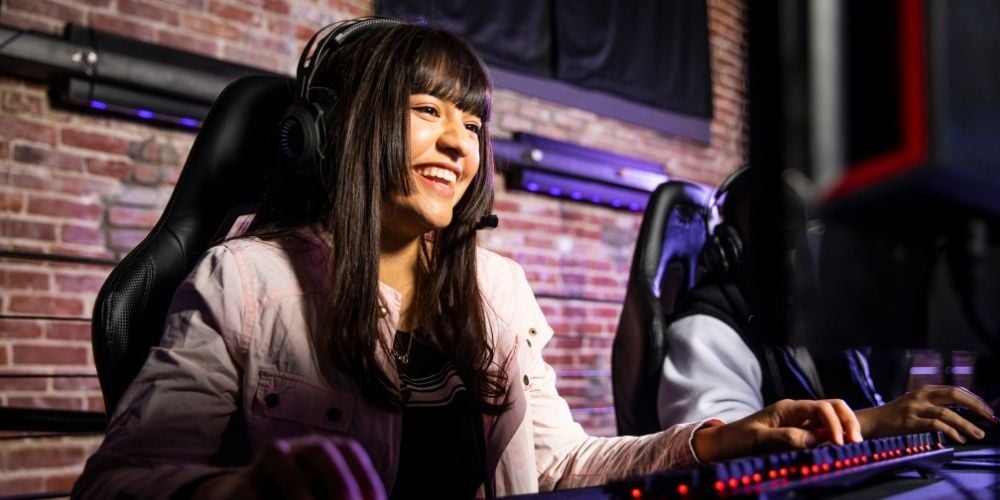Contents
- Why should esports be included in school?
- How do esports work in schools?
- Are there any esports schools?
Are virtual games good for your children? A surprisingly high number of other parents seem to think so!
A recent survey conducted by Dell Technologies revealed that over 70% of all parents in the U.K want esports to become a part of the country's standard school curriculum. The reason for this? Esports have been closely linked to the learning of important motor, creative, and analytical skills in young children.
When played in moderation (and under your supervision), these games can help your child develop superior hand-eye coordination and enhance their problem-solving skills. Many studies have proved the academic merit of esports.
Esport participants are found to have a higher interest in STEM (Science, Technology, Engineering, Mathematics) and above-average school grades. But, can esports really become a part of the general school curriculum? Keep on reading to find out.
Why should esports be included in school?
Here are a few reasons why many parents are keen for esports to be included in the school syllabus:
They have been linked to better grades
Esports players (especially competitive gamers) are exposed to a fun, competitive environment early on. This puts them in the habit of pushing themselves and working towards a common goal. As studies show, this translates to better academic and extracurricular performance in school. When played in moderation, esports can motivate your kids to step up and perform well in other areas, too.
It promotes teamwork
Has your child’s teacher ever expressed concern about their difficulty in working together with other students? This is actually fairly common, especially when children are young.
Teamwork is a skill that’s important for every student. Including esports in the school curriculum gives students the chance to work together in a fun and engaging environment. Many sport-based (hard to miss the current NBA2K22 phenomenon) and strategic planning games require players to develop and fix strategies to compete against each other. This helps your child mingle with other students, and it is a great opportunity for them to learn how to work with others.
Can lead to lucrative career paths
Like any other industry, esports provides a number of long-term job opportunities for players.
Careers? Sounds foolish when your child is only 10, right? Well, think again.
Many young competitive child gamers have gone on to make millions by participating in international competitions and streaming their live experiences on video sharing sites like Twitch and YouTube. Yes, it’s another shot at winning the elusive lottery!
An example of a child who re? Jaden Ashman a 15-year-old child recently took home over a million dollars in prize money from a single Fortnite tournament.
But, as a parent, one of your primary concerns here would be, where does this money come from?
To give a succinct answer, most of the gaming industry’s $175 billion of global revenue comes from advertising and user spending. Users spend money on games and then on in-game purchases in order to enhance their gaming experience (although there are a number of free games funded solely through ads). This money is then channelled towards game development, marketing, and competitive gaming.
Allows your child to be a part of a fun community
Esports leagues are known to form extremely beneficial communities around the globe. The High School Esports League (HSEL), for example, boasts teams from over 1,200 schools across North and South America. Many European esports leagues offer schools similar opportunities to get into accredited programs and compete with leading schools across the continent. This helps schools develop bustling campus communities that can help students hone their collaborative, logical, and creative skills and contribute towards their overall development.
What does this mean for your child? The opportunity to meet a number of other children and improve their social skills.
How do esports work in schools?
Esport clubs/groups are just like any other sport or extracurricular activities in affiliated high schools. Students are selected onto teams based on trials and interviews. These teams then practice under a designated coach (faculty member) who trains them for competitive meets and tournaments. Like other sports, esports are given specified time slots or ‘periods’ for practice. These might be during or after school hours, depending on the school.
Are there any esports schools?
Many secondary schools in the U.K offer esports classes and clubs as a part of their extracurricular programs. If your kid develops an avid interest in esports and wants to study it further, they can take up competitive gaming courses at one of the following universities in the U.K.
- Staffordshire University (Bachelors)
- University of Chichester
- Sheffield Hallam University
- University of Leicester
- University of York
- University of Roehampton
- Oxford University
- Leeds United
- Barnsley College
- West Suffolk College
You can also ask schools if they’re affiliated with the British Esports Association (BEA) - a national, non-profit organisation that’s creating awareness about the positive impact of esports.
Esports is fast becoming more than just a hobby for many children in the UK and worldwide. You should, of course, continue to monitor your child’s screen-time and internet activity as much as you can (without getting invasive).
With the right guidance and parental support, esports can turn out to be an extremely fun hobby and even a lucrative career opportunity for your child.










